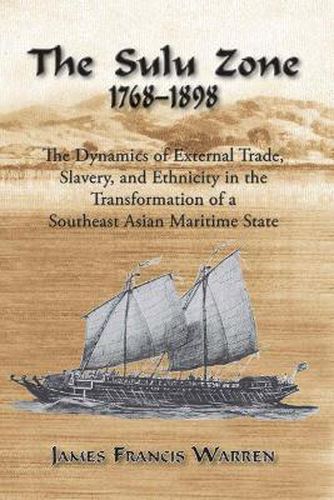Readings Newsletter
Become a Readings Member to make your shopping experience even easier.
Sign in or sign up for free!
You’re not far away from qualifying for FREE standard shipping within Australia
You’ve qualified for FREE standard shipping within Australia
The cart is loading…






First published in 1981,
The Sulu Zone
has become a classic in the field of Southeast Asian History. The book deals with a fascinating geographical, cultural and historical
border zone
centred on the Sulu and Celebes Seas between 1768 and 1898, and its complex interactions with China and the West. The author examines the social and cultural forces generated within the Sulu Sultanate by the China trade, namely the advent of organized, long distance maritime slave raiding and the assimilation of captives on a hitherto unprecedented scale into a traditional Malayo-Muslim social system.How entangled commodities, trajectories of tastes, and patterns of consumption and desire that span continents linked to slavery and slave raiding, the manipulation of diverse ethnic groups, the meaning and constitution of
culture,
and state formation? James Warren responds to this question by reconstructing the social, economic, and political relationships of diverse peoples in a multi-ethnic zone of which the Sulu Sultanate was the centre, and by problematizing important categories like
piracy ,
slavery ,
culture ,
ethnicity , and the
state . His work analyzes the dynamics of the last autonomous Malayo-Muslim maritime state over a long historical period and describes its stunning response to the world capitalist economy and the rapid
forward movement
of colonialism and modernity.It also shows how the changing world of global cultural flows and economic interactions caused by cross-cultural trade and European dominance affected men and women who were forest dwellers, highlanders, and slaves, people who worked in everyday jobs as fishers, raiders, divers or traders. Often neglected by historians, the response of these members of society are a crucial part of the history of Southeast Asia.
$9.00 standard shipping within Australia
FREE standard shipping within Australia for orders over $100.00
Express & International shipping calculated at checkout
First published in 1981,
The Sulu Zone
has become a classic in the field of Southeast Asian History. The book deals with a fascinating geographical, cultural and historical
border zone
centred on the Sulu and Celebes Seas between 1768 and 1898, and its complex interactions with China and the West. The author examines the social and cultural forces generated within the Sulu Sultanate by the China trade, namely the advent of organized, long distance maritime slave raiding and the assimilation of captives on a hitherto unprecedented scale into a traditional Malayo-Muslim social system.How entangled commodities, trajectories of tastes, and patterns of consumption and desire that span continents linked to slavery and slave raiding, the manipulation of diverse ethnic groups, the meaning and constitution of
culture,
and state formation? James Warren responds to this question by reconstructing the social, economic, and political relationships of diverse peoples in a multi-ethnic zone of which the Sulu Sultanate was the centre, and by problematizing important categories like
piracy ,
slavery ,
culture ,
ethnicity , and the
state . His work analyzes the dynamics of the last autonomous Malayo-Muslim maritime state over a long historical period and describes its stunning response to the world capitalist economy and the rapid
forward movement
of colonialism and modernity.It also shows how the changing world of global cultural flows and economic interactions caused by cross-cultural trade and European dominance affected men and women who were forest dwellers, highlanders, and slaves, people who worked in everyday jobs as fishers, raiders, divers or traders. Often neglected by historians, the response of these members of society are a crucial part of the history of Southeast Asia.